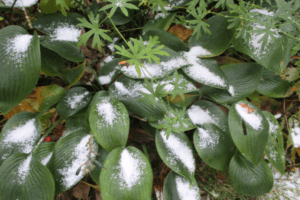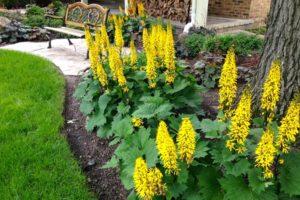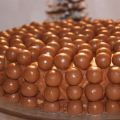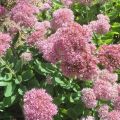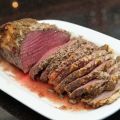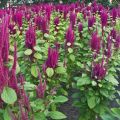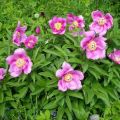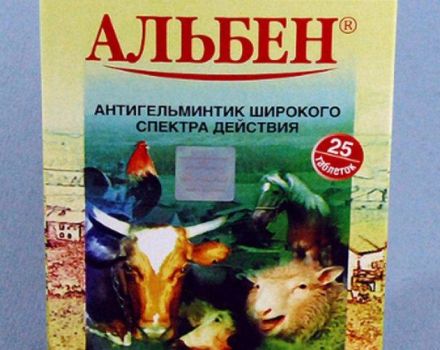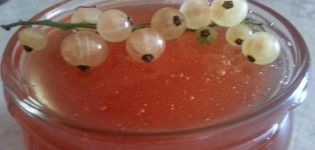Medicinal properties and contraindications of Echinacea, use and side effects
Echinacea is a flower, the benefits of which are known all over the world. It was also used by Indian tribes for healing wounds and preparing antidotes for snakebites. Decoctions were prepared from it to restore the strength of soldiers after battles.
Content
- 1 Chemical composition
- 2 Benefits of Echinacea
- 3 For what diseases is medicinal herb used
- 3.1 Colds, runny nose, flu, ARVI
- 3.2 Bladder and kidney disease
- 3.3 Cystitis and urethritis
- 3.4 Prevention, increasing immunity
- 3.5 Lymphadenitis
- 3.6 BPH
- 3.7 Headache, joint pain
- 3.8 Diseases of the gastrointestinal tract
- 3.9 HPV virus
- 3.10 Conjunctivitis
- 3.11 Open wounds, boils, ulcers, burns
- 3.12 Nervous disorders, stress, chronic fatigue
- 3.13 Inflammation of the mouth and throat
- 4 Traditional medicine recipes
- 5 Application of a unique plant for the skin
- 6 Contraindications and side effects
It has several types, but only one has medicinal properties. With the help of it, many diseases are cured, but not everyone can use it. Echinacea, with its medicinal properties, has some contraindications.
Chemical composition
The composition of chemical elements in Echinacea purpurea is very rich.
| All over the plant | In the leaves and stem | In the roots |
| Calcium | Flavonoids | Essential oils |
| Potassium | Saponins | Fixed oils |
| Manganese | Echinacin | Phenolcarboxylic acid |
| Zinc | Essential oils | Inulin |
| Cobalt | Polyamines | Betaine |
| Selenium | Polysaccharides | Glucose |
| Molybdenum | Echinolone | Resin |
| Silver | Echinacoside | |
| Enzymes | Acids: | |
| Kumarovaya | ||
| Organic | ||
| Ferulovaya | ||
| Coffee shop | ||
| Resin | ||
| Phytosterols | ||
| Tannins |
Important! When used correctly, echinacea can protect the body from many diseases, reduce the risk of complications and accelerate recovery..
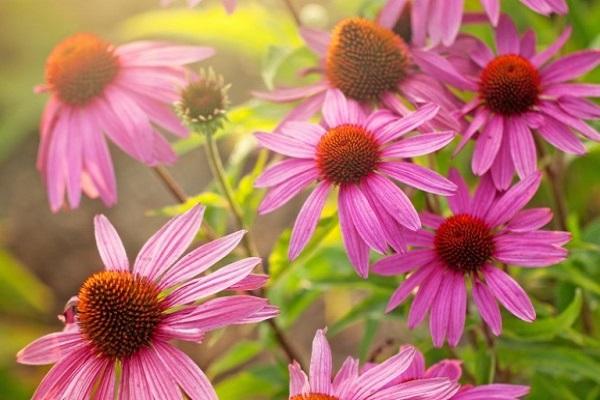
Benefits of Echinacea
The main property is considered to increase immunity. The preparations with this flower are antiviral and anti-inflammatory.
For the female body
Good effects are given when women are infected with fungi and infections.
With inflammation:
- in the ovaries;
- in the cervix;
- bladder;
- kidneys.
The funds normalize the hormonal background due to the beneficial effect on the thyroid gland and adrenal glands.
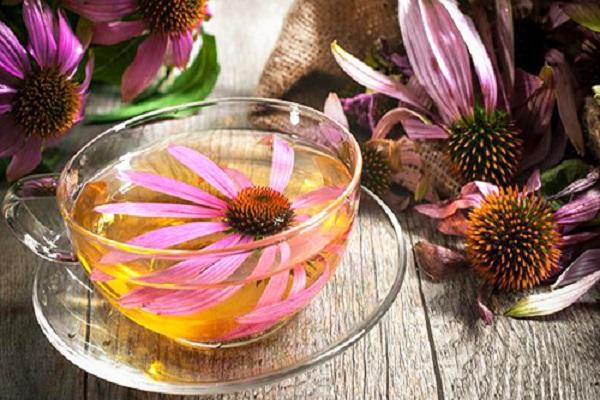
For men
Echinacea is only beneficial for men. With its help, diseases of the organs of the reproductive system are treated. Helps with:
- inflammatory diseases;
- prostatitis;
- adenoma;
- genital infections.
Echinacea cleanses from toxic substances and restores the body's protective barrier.
Medicinal properties for children
Children are given echinacea medications for:
- prevention of influenza and ARVI;
- strengthening immunity;
- treatment of stomatitis and gum disease;
- inhalations for bronchitis;
- healing wounds.
Compresses are used for external use. They will help relieve inflammation from abrasions, bites, and cuts. The tincture is diluted with warm water 1: 2 and soaked in gauze, which is applied to the site of inflammation.
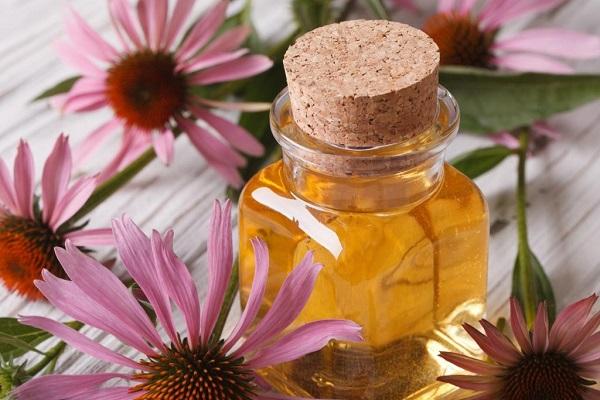
For what diseases is medicinal herb used
There are indications for the use of echinacea-based drugs. In some cases, they can be of an auxiliary nature, and in some cases, the main one (to restore immunity).
Colds, runny nose, flu, ARVI
It is useful to take a decoction. A tablespoon of the root is poured with 300 grams of water, mixed and placed in a steam bath for half an hour. Cool and drink 30 grams before meals.
Bladder and kidney disease
Special tincture: 20 grams of the herb is mixed in a glass of alcohol. Pour into a bottle and leave for 21 days in a dark place. Drink 20 drops for 10 days.
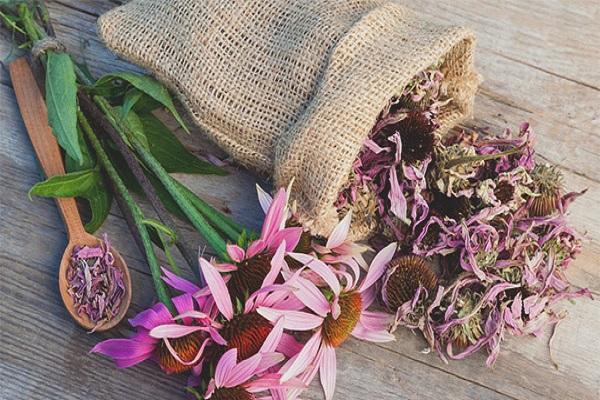
Cystitis and urethritis
Echinacea helps relieve inflammation and activate human immunity. For these diseases, a mixed composition or infusion is used.
Take equal parts bearberry, yarrow and Echinacea purpurea inflorescences. For 10 grams of dry mixture, 300 milliliters of boiling water is needed. Keep on low heat for 15 minutes. Then wrap it up with a towel and leave for an hour. Take 80 milliliters before meals.
Prevention, increasing immunity
To strengthen the body's defenses, they drink a decoction. Preparation: 1.5 teaspoon of raw materials is poured with 350 milliliters of boiling water and sent to a water bath for a quarter of an hour. This is a serving for 3 doses: 100 ml before meals. The course is from 2 to 3 weeks.
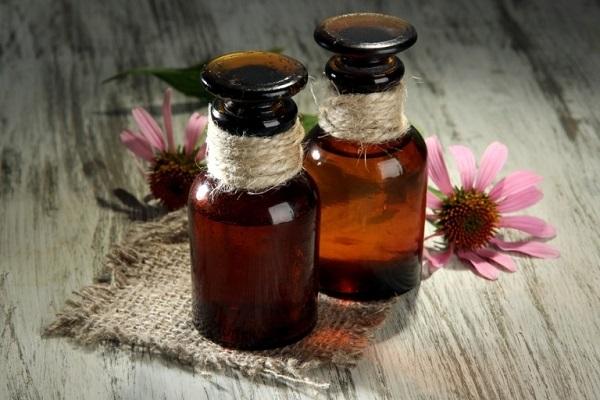
Lymphadenitis
Lymphadenitis is an inflammatory process in the lymph nodes. Appears due to the penetration of various microorganisms into them. It is characterized by soreness and swollen lymph nodes in the groin and neck.
Echinacea contains bioactive substances that restore the protective functions of the immune system. Echinacea is used in combination with antibiotics and antiviral drugs. Adults: 4 times a day, 10 drops of tincture.
Children are given syrup. It is boiled with 4 tablespoons of chopped plant roots and 350 ml of water, 20 minutes. Then add 3 tablespoons of fresh mint. After cooling and straining, a couple of tablespoons of honey are dissolved in the broth. The child is given syrup three times a day, 1 teaspoon.
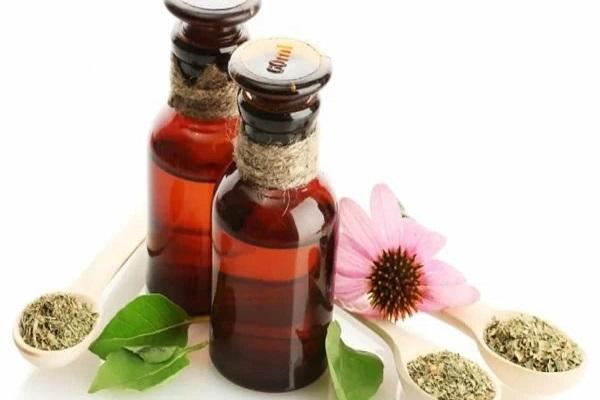
BPH
The infusion will have a positive effect. To do this, fresh or dry leaves are placed in a jar at the bottom and poured with vodka 1:10. Leave in a dark place for 14 days. Drink 25 drops before meals, 3 times a day.
Headache, joint pain
The decoction can reduce joint pain, relieve migraine and insomnia. To do this, boil 200 grams of water with a teaspoon of plant leaves for 10 minutes. Then leave to infuse for an hour. You need to drink before meals, 100 milliliters each.
Diseases of the gastrointestinal tract
Echinacea tincture is effective for diseases of the gastrointestinal tract and constipation. It is recommended to take it 3 courses in a row, with three-day intervals after each. One course is 10 days. Drink the tincture 3 times a day, 30 drops each.
Preparation: 20 grams of the plant are poured with 200 grams of vodka. Insist in a dark place for 3 weeks, shaking occasionally.
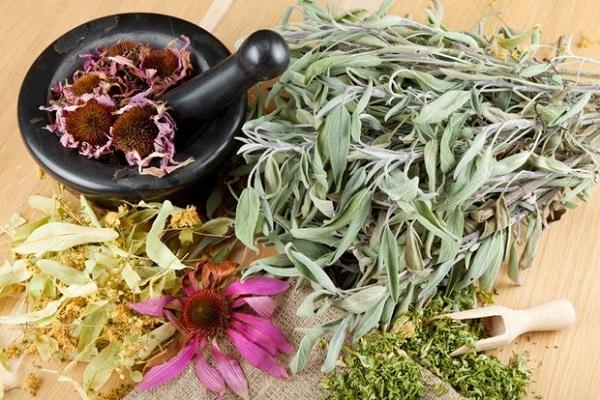
HPV virus
After the papilloma has been removed, echinacea tincture is used to raise immunity and prevent the recurrence of the disease.
Preparation of the tincture: you need to take the herb and 70% alcohol (1:10). The tool is infused for 14 days. After straining, drink for 1 month, 20 drops, 3 times a day.
Conjunctivitis
With conjunctivitis, a decoction is used for internal and external use. Take 1 tablespoon of echinacea roots per 200 grams of water and simmer over low heat for half an hour. Then they cool and filter. Drink 4 times a day, 2 tablespoons.
Open wounds, boils, ulcers, burns
The flower juice has antiseptic, healing and anti-inflammatory effects. It is used for skin lesions. The substances contained in it accelerate wound healing and increase blood clotting.
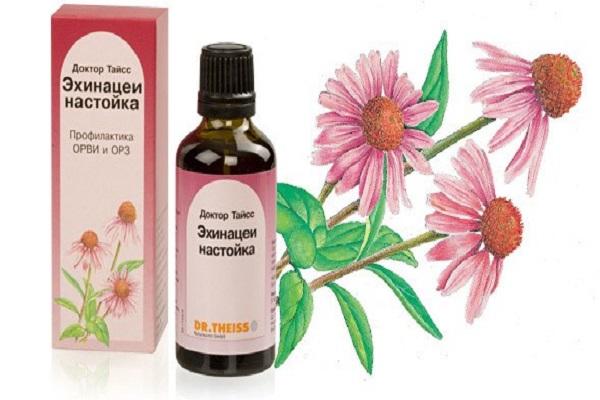
For eczema and psoriasis, use a tincture. For preparation, take 60 drops of tincture and dilute in 100 milliliters of physical solution. Gauze soaked in this agent is applied to the sore spot and fixed with a bandage. You need to change the bandage 2 times a day.
Nervous disorders, stress, chronic fatigue
For these diseases, a decoction and tincture are used. Tincture recipe: 10 grams of chopped plant roots are added to 100 grams of vodka and insisted for a day. Then filter and drink 30 drops, 3 times a day.
Inflammation of the mouth and throat
In case of inflammation of the oral cavity, alcohol tincture and infusions from a medicinal plant are used for rinsing. This treatment helps relieve inflammation and pain. Restores damaged mucous membranes by killing pathogenic microorganisms.
For the broth, take 1 tablespoon of raw materials and pour a glass of boiling water. Let it brew for 1 hour and filter. Gargle up to 4 times a day.
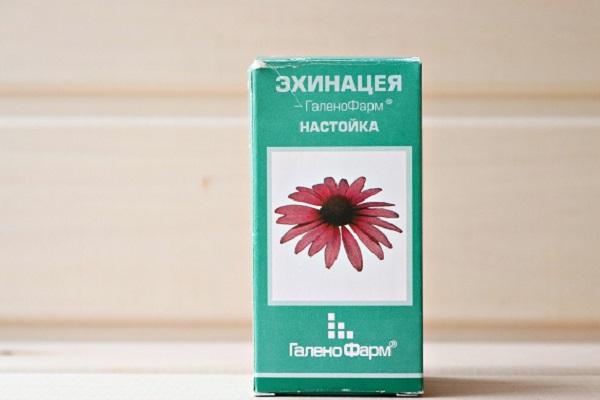
Traditional medicine recipes
Echinacea is a very popular medicinal plant among folk healers.
Oil extract from plant roots
Fresh, peeled and cut roots - 100 grams, poured with refined vegetable oil - 500 milliliters. They insist for a month.
Application:
- with inflammatory processes in the upper respiratory tract. Drink 1 teaspoon after meals with water;
- with a stomach ulcer. Mix 1 tablespoon each of sea buckthorn and echinacea oil. The course of treatment is 1-2 weeks.
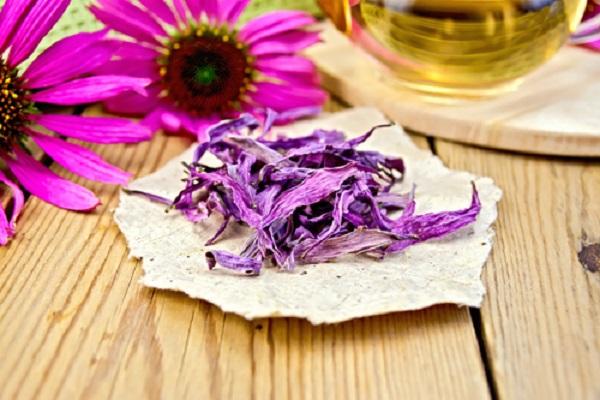
Fresh inflorescence juice
Juice is squeezed out of the crushed inflorescences. Without diluting anything, take 5 milliliters before meals, for colds.
Infusion
A handful of dry leaves are poured into a thermos and poured with one liter of boiling water. Let it brew for 4 hours. Take 50 ml, 5 times a day. Helps with cystitis.
Echinacea decoction
You need 30 grams of flower buds and 500 grams of boiling water. After boiling, simmer over low heat for 15 minutes. Remove and leave for 3 hours. Take 100 milliliters before meals, 3 times a day.
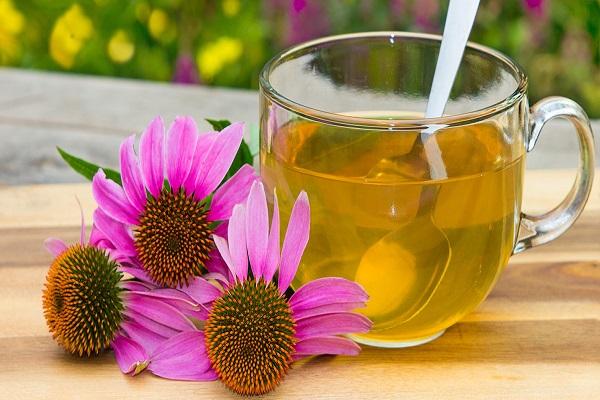
Tea
Used for colds. Leaves and other parts of the flower are used. You can add rose hips. One teaspoon of a dry mixture of herbs and several rose hips is poured with 500 grams of boiling water and allowed to brew for 10 minutes. At one time, you need to drink 0.5 glasses of warm tea.
Tincture of raw plant root
Take a fresh root and pour in 100 milliliters of alcohol. Infused in a dark place for 24 hours. Take three times a day, 20 drops. Recommended for depression.
Echinacea universal alcoholic tincture
All parts of the plant are used for manufacturing. Take 100 grams of raw materials and pour 400 grams of alcohol. Insist 14 days.
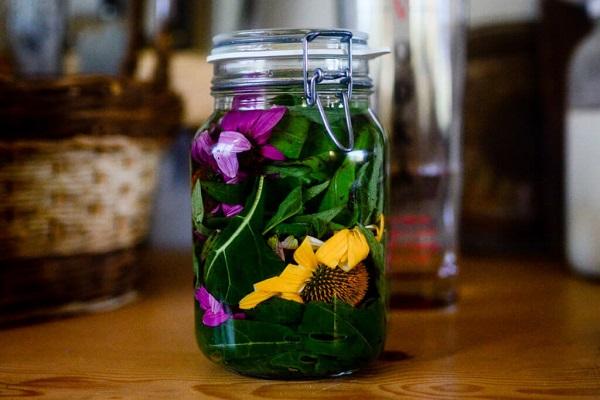
Application of a unique plant for the skin
For the skin, use freshly squeezed juice from the leaves. They lubricate problem areas before bedtime:
- abscesses;
- acne;
- dark spots;
- freckles.
Freshly squeezed juice will provide first aid for insect bites.
Contraindications and side effects
Echinacea not only brings health benefits, it can sometimes be harmful. Preparations with it cannot be used:
- children under 12 years old;
- people with diabetes mellitus;
- patients with tumors;
- hypertensive patients;
- women during pregnancy and lactation.
Use with caution in elderly people.

Effect on pressure
Taking echinacea increases blood pressure. Because of this, it is contraindicated to use it for hypertensive patients. On the contrary, the plant has a beneficial effect on hypotonic patients. It helps to improve vascular tone and has a tonic effect on the entire body. This is very important for people with low blood pressure.
Important! If hypotension has become a symptom of endocrine abnormalities or disorders of the central nervous system, then echinacea can alleviate the patient's condition, but will not give significant improvements.
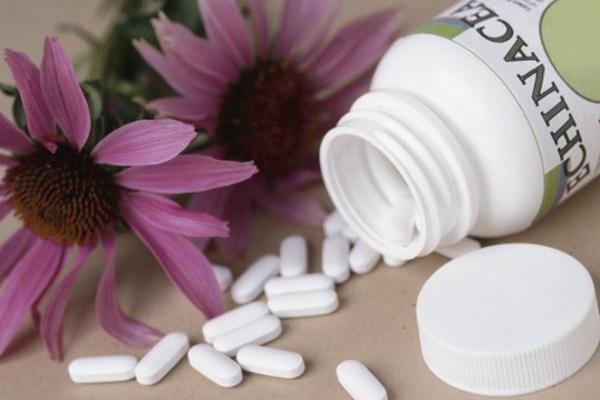
Can Echinacea cause fever?
Sometimes after using echinacea, the body temperature may rise. Don't panic - that's okay. A weakened immune response to the invasion of antigens occurs.
If a person rarely suffers from colds or becomes infected with a virus during epidemics, then he does not need echinacea. He already has good immunity, and there is no need to strengthen it.
